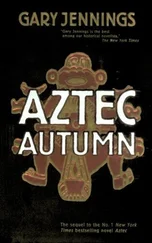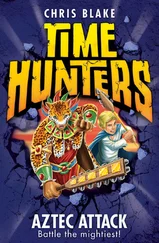Gary Jennings - Aztec
Здесь есть возможность читать онлайн «Gary Jennings - Aztec» весь текст электронной книги совершенно бесплатно (целиком полную версию без сокращений). В некоторых случаях можно слушать аудио, скачать через торрент в формате fb2 и присутствует краткое содержание. Жанр: Старинная литература, на английском языке. Описание произведения, (предисловие) а так же отзывы посетителей доступны на портале библиотеки ЛибКат.
- Название:Aztec
- Автор:
- Жанр:
- Год:неизвестен
- ISBN:нет данных
- Рейтинг книги:4 / 5. Голосов: 1
-
Избранное:Добавить в избранное
- Отзывы:
-
Ваша оценка:
- 80
- 1
- 2
- 3
- 4
- 5
Aztec: краткое содержание, описание и аннотация
Предлагаем к чтению аннотацию, описание, краткое содержание или предисловие (зависит от того, что написал сам автор книги «Aztec»). Если вы не нашли необходимую информацию о книге — напишите в комментариях, мы постараемся отыскать её.
"Anyone who reads, anyone who still lusts for adventure or that book you can't put down, will glory in Aztec."--Los Angeles Times
Aztec
Aztec
Aztec — читать онлайн бесплатно полную книгу (весь текст) целиком
Ниже представлен текст книги, разбитый по страницам. Система сохранения места последней прочитанной страницы, позволяет с удобством читать онлайн бесплатно книгу «Aztec», без необходимости каждый раз заново искать на чём Вы остановились. Поставьте закладку, и сможете в любой момент перейти на страницу, на которой закончили чтение.
Интервал:
Закладка:
When I had donned one of those stylish outfits, Cozcatl led me again around the palace grounds, pointing out the buildings containing schoolrooms. There were more classes available than in any calmécac. I was most interested, of course, in those dealing with word knowing, history, geography, and the like. But I could also, if I chose, attend classes in poetry, gold and silver work, feather work, gem cutting, and various other arts.
"The classes that do not require tools and benches are held indoors only in bad weather," said my little guide. "On fine days like this, the Lord Teachers and their students prefer to work outside."
I could see the groups, sitting on the lawns or gathered about the marble pavilions. The teacher of every class was an elderly man wearing a distinctive yellow mantle, but his students were an assortment: boys and men of varying sizes and ages, here and there even a girl or a woman or a slave sitting slightly apart.
"The students are not graded by age?" I asked.
"No, my lord, but by their ability. Some are much further along in one subject than in another. When you first attend, you will be interrogated by each Lord Teacher to determine in which of his classes you will fit best—for example, among the Beginners, the Learners, the Somewhat Learned, and so on. He will grade you according to what knowledge you already have and what he judges to be your capacity for learning more."
"And the females? The slaves?"
"Any daughter of a noble is allowed to attend, all the way through the highest grades, if she has the ability and the desire. The slaves are allowed to study as far as is consistent with their particular employments."
"You yourself are well spoken, for such a young tlacotli."
"Thank you, my lord. I went as far as learning good Náhuatl, deportment, and the rudiments of housekeeping. When I am older I may apply for further training, in hope of someday becoming Master of the Keys in some noble household."
I said grandly, expansively, generously, "If ever I have a noble household, Cozcatl, I promise you that position."
I did not mean "if," I meant "when." I was no longer idly wishing for a rise to eminence, I was already envisioning it. I stood there in that lovely parkland, my servant at my side, and I stood tall in my fine new clothes, and I smiled to think of the great man I would be. I sit here now, among you, my reverend masters, and I sit bent and shriveled in my rags, and I smile to think of the puffed-up young pretender I was.
The Lord Teacher of History, Neltitica, who looked old enough to have experienced all of history, announced to the class, "We have with us today a new piltontli student, a Mexícatl who is to be known as Head Nodder."
I was so pleased to be introduced as a "young noble" student that I did not wince at the nickname.
"Perhaps, Head Nodder, you would be good enough to give us a brief history of your Mexíca people...."
"Yes, Lord Teacher," I said confidently. I stood up, and every face in the class turned to gaze at me. I cleared my throat and said what I had been taught in Xaltócan's House of Learning Manners:
"Know, then, that my people originally dwelt in a region far to the north of these lands. It was Aztlan, The Place of Snowy Egrets, and at that time they called themselves the Aztlantláca or the Aztéca, the Egret People. But Aztlan was a hard country, and their chief god Huitzilopóchtli told them of a sweeter land to be found to the south. He said it would be a long and difficult journey, but that they would recognize their new homeland when they reached it, for they would see there a nopali cactus on which perched a golden eagle. So all the Aztéca abandoned their fine homes and palaces and pyramids and temples and gardens, and they set out southward."
Someone in the class snickered.
"The journey took sheaves upon sheaves of years, and they had to pass through the lands of many other peoples. Some were hostile; they fought and tried to turn the Aztéca back. Others were hospitable and let the Aztéca rest among them, sometimes for a short while, sometimes for many years, and those peoples were repaid by being taught the noble language, the arts and sciences known only to the Aztéca."
Someone in the class murmured, and someone else gave a low chuckle.
"When the Aztéca came finally into this valley, they were kindly received by the Tecpanéca people on the western shore of the lake, who gave them Chapultepec for a resting place. The Aztéca lived on that Grasshopper Hill while their priests continued to range about the valley in search of the eagle on the nopali. Now, in the Tecpanéca dialect of our language, the nopali cactus is called tenochtli, so those people called the Aztéca the Tenochca, and in time the Aztéca themselves took that name of Cactus People. Then, as Huitzilopóchtli had promised, the priests did find the sign—a golden eagle perched on a cactus—and this they found on a not-yet-peopled island in the lake. All the Tenochca-Aztéca immediately and joyfully moved from Chapultepec to that island."
Someone in the class laughed openly.
"On the island they built two great cities, one called Tenochtítlan, Place of the Cactus People, and the other Tlaltelólco, The Rocky Place. While they were building the cities, the Tenochca noticed how every night they could see from their island the moon Metztli reflected in the lake waters. So they also referred to their new habitation as Metztli-Zictli, In the Middle of the Moon. In time, they shortened that to Mexitli and then to Mexíco, and eventually came to call themselves the Mexíca. For their sign they adopted the symbol of the eagle perched on the cactus, and the eagle holds in its beak the ribbonlike symbol which represents war."
A number of my new classmates were laughing by now, but I persevered.
"Then the Mexíca began to extend their dominion and influence, and many peoples have benefited, either as adoptive Mexíca or as allies or as trading partners. They learned to worship our gods, or variations of them, and they let us appropriate their gods. They learned to count with our arithmetic and mark time by our calendars. They pay us tribute in goods and currency, for fear of our invincible armies. They speak our language out of deference to our superiority. The Mexíca have built the mightiest civilization ever known in this world, and Mexíco-Tenochtítlan stands at its center—In Cem-Anáhuac Yoyótli, The Heart of the One World."
I kissed the earth to the aged Lord Teacher Neltitica and sat down. My classmates were all waving their hands for permission to speak, meanwhile making a clamor of noises ranging from laughter to hoots of derision. The Lord Teacher gestured imperiously, and the class sat still and silent.
"Thank you, Head Nodder," he said politely. "I had wondered what version the Mexíca teachers were expounding these days. Of history you know abysmally little, young lord, and what little you know is wrong in almost every particular."
I stood up again, my face as hot as if I had been slapped. "Lord Teacher, you requested a brief history. I can elaborate in more detail."
"Kindly spare me," he said. "And in return I will do you the kindness of correcting just one of the details already proffered. The words Mexíca and Mexíco did not derive from Metztli the moon." He waved for me to be seated, and addressed the class as a whole:
"Young lord and lady students, this illustrates what I have often told you before now. Be skeptical of the many versions of the world's history you are likely to hear, for some are as full of impossible invention as they are of vanity. What is more, I have never met a historian—I have never met any sort of professional scholar who could put into his work the slightest trace of humor or ribaldry or jollity. I have never met one who did not consider his particular subject the most momentous and weighty of all studies. Now, I concede the importance of scholarly works—but need importance always wear the long face of stern solemnity? Historians may be serious men, and history may sometimes be so somber that it saddens. But it is people who make the history, and they often play pranks or cut capers while they are doing it. The true story of the Mexíca confirms that."
Читать дальшеИнтервал:
Закладка:
Похожие книги на «Aztec»
Представляем Вашему вниманию похожие книги на «Aztec» списком для выбора. Мы отобрали схожую по названию и смыслу литературу в надежде предоставить читателям больше вариантов отыскать новые, интересные, ещё непрочитанные произведения.
Обсуждение, отзывы о книге «Aztec» и просто собственные мнения читателей. Оставьте ваши комментарии, напишите, что Вы думаете о произведении, его смысле или главных героях. Укажите что конкретно понравилось, а что нет, и почему Вы так считаете.











